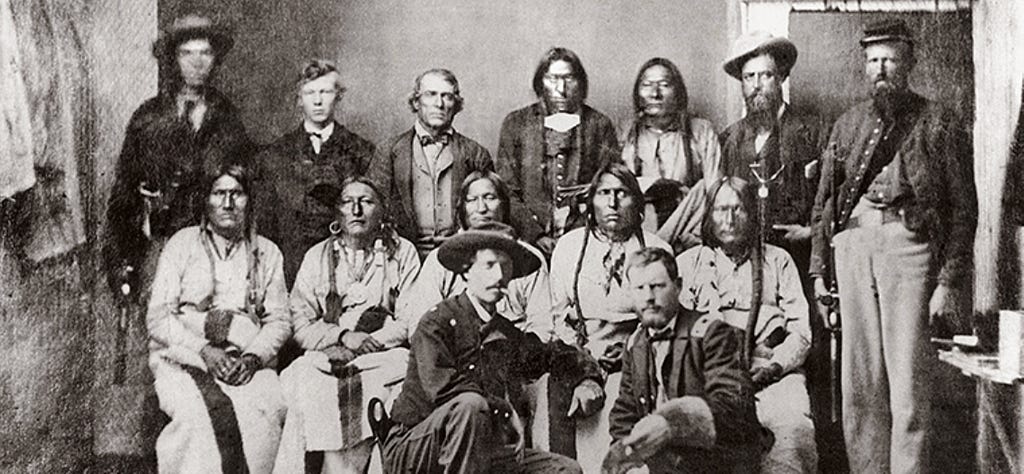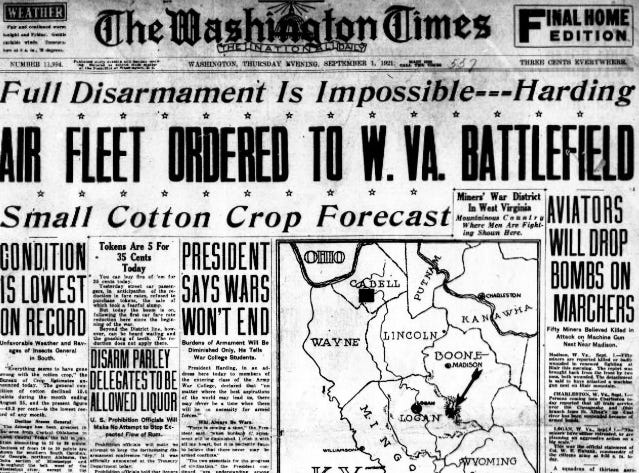
Some years back, I attended a talk given by a friend, a respected scholar of American Indian history, on the infamous Sand Creek Massacre of 1864. I won’t go in depth here on the episode, except to note that the United States Army acted with exceptional cruelty in killing Cheyenne and Arapahoe women and children. This testimony of one of the officers present, reprinted in Helen Hunt Jackson’s 1881 A Century of Dishonor, will suffice to characterize the whole:
"There was one little child, probably three years old, just big enough to walk through the sand. The Indians had gone ahead, and this little child was behind, following after them. The little fellow was perfectly naked, travelling in the sand. I saw one [United States Army soldier] get off his horse at a distance of about seventy-five yards and draw up his rifle and fire. He missed the child. Another man came up and said, 'Let me try the son of a b——. I can hit him.' He got down off his horse, kneeled down, and fired at the little child, but he missed him. A third man came up, and made a similar remark, and fired, and the little fellow dropped.”
This sort of thing is nearly unbearable to read, much less to contemplate, but it is the record and we ought not look away from it. During the Q&A, I observed that there was a contradiction at hand: the United States Army in 1864 was on a great mission of liberation in the South, while executing a cruel mission of extermination in the West. My friend (for whom I do not intend to speak here, so I paraphrase) responded essentially that I did not understand the history at all. To concatenate a decade-plus of intellectual evolution — although that word implies ascent, so perhaps a better one is change — I eventually concluded that he was entirely correct. I didn’t understand the history, because I didn’t understand the terms and conditions of the American regime. What I subscribed to then was the classic American-progress narrative, “the flag that makes you free,” at the core of regime propositionalism. It was a lens imparted by the school of the late great Harry Jaffa, which holds that the American Founders solved the classical best-regime problem in modernity. Michael Anton gives an excellent exposition of that case in conversation with Lafayette Lee, and suffice it to say it is at once appealing and also leads toward analytic error. If the Jaffa case as understood is that Burkean “[c]ircumstances … give in reality to every political principle its distinguishing color and discriminating effect,” then that is of course correct. But if the case is that there is a new man made by the New World, then it is wrong.
Set aside Jaffa’s intent, which I do not pretend to exposit: this last is the American-regime case, and has been for generations. The fundamental case of propositionalism is that the nation-as-idea supersedes all else, all the enduring ties and sentiments and affections that have characterized men and their communities for endless millennia, from religion to history to family to class and beyond — a force of dissolution that is at once also force of alternative union. The American political genius has been to not to do this in a way that nearly any other utopian political project would have, which is through general force and extermination. The French, the Russians, and the Chinese would go to war against their own peoples to remake them: the Americans, being the children of the English, preferred to allow liberty within the propositional framework. Time and civic erosion do the rest. (One might amend this to be the English of the eighteenth century: those of the sixteenth and seventeenth did in fact go the route of pitiless repression more than once.) Outside that framework, however, you get shooting children at Sand Creek, the occupation of the Philippines (in which my own great-grandfather participated as a U.S. Army cavalryman in 1910-1912), the burning of the Shenandoah Valley, and bombers attacking West Virginians. This was what my better-educated companion was trying to impart: that there was a fundamental continuity between Sand Creek and Sherman’s March. Yes, one could impart to the latter a virtuous end absent from the former, but they both happened for the same reason: the republic was in the business of absolutely eradicating its opposition, and this enjoyed majority support from the propositionalist public which it created.
This understanding is correct, but it too can lead to analytic error, in ways familiar to anyone exposed to the intellectual inadequacies of Howard Zinn, or some of the more-modern expositors of America as a force for evil. America is all the things set forth above, and its regnant ideology — which had to be imposed by force on arms on a great deal of the country — did and does do these things. But history and human events are rarely singular in their qualities, and so we must acknowledge that America is the nation of Sand Creek and every other abhorrent deed one might list — and also the nation that was the greatest worldly force for liberty across the past century. Lose that, and you lose the whole of the thing. We understand history on the terms understood within its contexts — and we also look to its effects outside of them. It is impossible to make the case that no America would have been better for humanity than for America as it was.
This is true even with propositionalism, which readers here know to be an enduring fiction now propelling the nation into crisis — and not just the American nation. At its best, propositionalism looks like José de la Luz Sáenz, an American of Mexican ethnicity who had ample reason to dislike and distrust the American regime in his time. The Mexicans in south Texas in the year of his birth were essentially a conquered people, and they endured a sanguinary counterinsurgency at the hands of Texas governance in the 1915-1919 period. Yet when de la Luz Sáenz left to volunteer to fight as a United States Army solider in the First World War, he left this note on the door of his one-room schoolhouse in Cotulla, Texas:
My dear students …. Next Monday, at eleven in the morning, I will become part of the militia that will defend our country. Until now, I have used pencil and pen to wage trying battles for the educational advancement of our people. You will soon hear that I am holding a rifle in the very trenches of France and upholding our people’s pride for the glory and honor of our flag. I do not know if you will have to follow me. I hope not. But if you do, I hope that my example helps you to be brave and strong enough to free yourself from everything that is dear on earth—the sweet peace, your homes, and your families.
I am not going on an excursion, I know that the life that awaits me will be difficult, the most demanding that I will have experienced, but I do not think it will be as difficult as Washington’s crossing of the Delaware and his stay at Valley Forge. If it becomes just as difficult, so much the better, it will be a greater honor for our people.
Long live Washington!
Long live the Star Spangled Banner!
Long live our raza!
What has George Washington to do with a descendant of Nuevo Santander? What has the Star Spangled Banner to do with a people who were overrun by its armies — in de la Luz Sáenz’s generation, during the lifetime of their grandparents? Well, in fact, a great deal: not historically, and not through ties of ordinary sentiment, but instrumentally. (There’s a reason the nation’s largest celebration of George Washington’s birthday is in Laredo, Texas: a development that surely would have shocked the Spanish ranchers in Laredo’s environs who drove their cattle for the sustenance of the Spanish armies fighting to aid American independence.) What propositionalism here offered was a pathway to allegiance and framework-inclusion absent the ordinary Aristotelian mechanisms of political union and civic partnership. The Mexican-Americans of south Texas after 1920 took it, after resisting it in various ways for most of the preceding century, and the rest is history. (Benjamin Heber Johnson’s work is the key read on this process.) I discuss the American-patriotic military culture that thereby arose, including heroic figures like Freddy Gonzalez and Roy P. Benavidez, on the latest School of War podcast. Suffice it to say here that this is an example of the system working as intended.
Eliot Wilson, in his latest, discusses propositionalism — without naming it — as the fundamental quality of the United States that may in time facilitate its further growth with the addition of new states. There’s a word that appears within it only once, in the Russian context, that deserves more exposition than it gets: empire. Within that specifically Russian context, Dominic Lieven in his (outstanding) 2009 Russia Against Napoleon writes on just how normative empire actually was, and is:
Both generally and in the Russian case it seems to me a mistake to see everything in the imperial tradition as harmful and the nation as the inevitable embodiment of virtue. This is in no sense a justification for neo-empire in today’s world. But empire in its day – unlike very many nations – was often relatively tolerant, pluralist and even occasionally benevolent in its attitude toward the many communities who sheltered under its protection.
Expand the aperture a bit, and it becomes easy to see how this applies to the case of the Mexicans within America — and to every other demographic cohort and constituency within America as well. (One could as easily write a book on the Latter-Day Saints’ decision to tightly embrace the regime that lately sought their own total dissolution.) On Christmas Day 1780, Thomas Jefferson wrote to George Rogers Clark of his determination to “add to the Empire of liberty an extensive and fertile Country” within the vast American continent. Jefferson in his thought meant the phrase as an arresting rhetorical paradox, empire and liberty coexisting poorly together in his ideology and experience. But here the great Founder’s political and historical imagination failed him, as did his forecast: for liberty’s blessings may flow, but an empire is an empire all the same.





